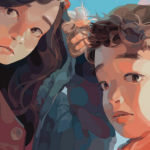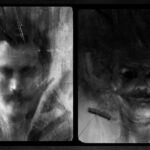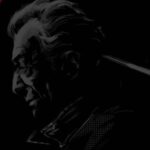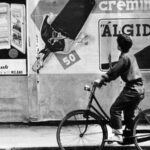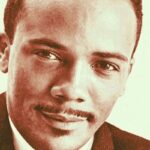TODAY: In 1933, Oliver Sacks, neurologist, author, and academic is born.
- “He lies, bullies, menaces, dishes it out but can’t seem to take it, exhibits such a muddy understanding of certain American principles… that he might be a seventeenth-century Austrian prince time-transported here to mess with us.” George Saunders attends a Trump rally. | The New Yorker
- Lidudumalingani has been awarded the Caine Prize for his story “Memories We Lost.” | Caine Prize
- “In a literary marketplace where the very image of a woman is seen as antithetical to literature, Ferrante’s covers take an important stand.” On female-oriented covers of Elena Ferrante. | The Atlantic
- On Speak, Memory, Vladimir Nabokov’s “exquisite paean to memory itself.” | Humanities
- “I don’t want to be burdened with the responsibility of thinking: How can this be instructive or valuable? I try to go into writing already believing anything I have to say, no matter how small or petty or weird, is already valuable.” Karan Mahajan, Tanwi Nandini Islam, and Jenny Zhang in conversation. | VICE
- Unabashedly feminist books preparing to take the publishing world by storm: On Emily Books’ new imprint with Coffee House Press. | Brooklyn Magazine
- “The Man Booker International books come into English from only twenty-six languages, fourteen of which are official languages of the European Union—and those fourteen languages account for more than two-thirds of all the books submitted.” An analysis of the the Man Booker International Prize entries. | The Man Booker Prizes
- How do we imagine the literary scholar to be different from the literary blogger? On the evolving role of the public intellectual in the post-comp lit era. | 3:AM Magazine
- 9,000 words on 92 titles: A preview of the most anticipated books of the second half of 2016. | The Millions
- “There is no way to read DeLillo’s novels and not understand that—at least on a subconscious level—he saw it coming.” How Don DeLillo prophesized 9/11. | The New Inquiry
- “He followed me everywhere with his letters. Everywhere I went, I wrote him letters. Everywhere I went, I wrote about him.” Jennifer Tseng on re-reading letters from her father. | Electric Literature
- Esmé Weijun Wang’s The Collected Schizophrenias, which “powerfully breaks open the social, historical, medical, and spiritual aspects of schizophrenia,” has won the Graywolf Press Nonfiction Prize. | Graywolf Press
- “it doesn’t feel like a time to write/when all my muses are begging/for their lives.” A poem by Danez Smith. | BuzzFeed Reader
- “Beckett came to believe failure was an essential part of any artist’s work, even as it remained their responsibility to try to succeed.” On the artistic failings (and successes) of Samuel Beckett. | The Guardian
- Why Elie Wiesel deserves a biography that “continue[s] to bear witness to what he saw.” | Signature Reads
- Alexander Chee, Jenny Han, and J. Courtney Sullivan recommend summer reading. | Vulture
Also on Literary Hub:
Article continues after advertisement
- The genius of William Shawn, and the invention of The New Yorker: David Remnick on the post-war evolution of an American literary institution.
- How to write a short story: Helen Phillips and Matthew Vollmer on the art of the form.
- On the comedy of history, and the importance of a good joke: Christopher Bram finds humor in the greatest literature.
- There would be no fourth of July without the Iroquois nation, from Bev Sellars’s Price Paid: The Fight for First Nations Survival.
- Cynthia Ozick on the letters of Saul Bellow.
- The literature of tennis is the literature of life: all of existence within the lines.
- Nicole Dennis-Benn and Chinelo Okparanta on language, character, and the perils of code-switching.
- Lorraine Berry on Sisyphus as the ultimate soccer fan, and the intensity of family rivalries.
- How the writer researches: John Freeman talks to Annie Proulx in her home, deep in the woods.
- On the tricky genius of Yuri Herrera’s character names: Lisa Dilling shares a translator’s secrets.
- The ongoing relevance of Thomas Pynchon’s The Crying of Lot 49, 50 years later.
- Marriage, am I doing it right? On James Salter, Ingmar Bergman, and finding the answers in art.
- Funeral masque: an elegy for Geoffrey Hill by Ishion Hutchinson.
- Walking while black: Garnette Cadogan on the realities of being black in America.
- We need to keep writing (and talking) about these endless wars: J. Kael Weston on the importance of Iraqi and Afghan stories.
- Reading the future of Cuba in its abandoned National Art Schools: on space, history, and building a revolution on a golf course.
- Why spiritualism persists in our fictions and culture.
- How I learned to stop checking my book’s sales: on the anxiety of literary fame.
3AM MagazineBrooklyn MagazineBuzzFeed ReaderCaine PrizeElectric LiteratureGraywolf PressHumanitieslithub dailySignature ReadsThe AtlanticThe GuardianThe Man Booker PrizesThe MillionsThe New InquiryThe New YorkerVICEVulture



